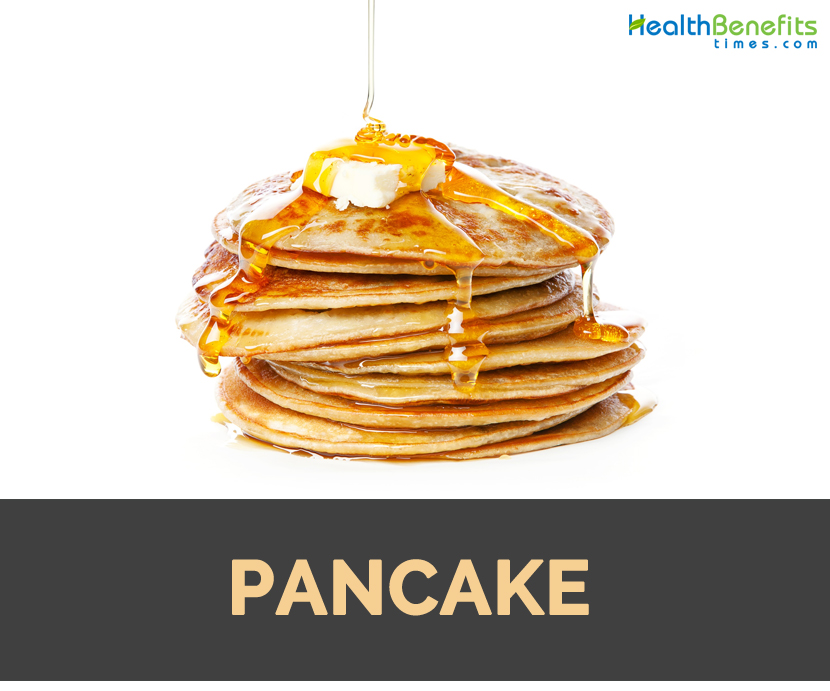Health Benefits of Pancakes
- Sodium and sugar
Pancakes possess both sweet and savory taste. The sweetness comes with an addition of granulated sugar in the recipe. The serving of pancakes provides 4.3 g of sugar but an addition of maple sugar on pancakes offers more. It is recommended to intake sugar to less than 10 percent of daily calories. Fresh fruits are used to sweeten pancakes rather than using syrup to maintain the intake of sugar low. Salt added in pancake batter offers 308 milligrams of sodium per serving.
- Vitamins and minerals
Pancakes offers phosphorus and calcium meeting 20% and 18% of daily recommended intake respectively. It makes pancakes better option for promoting bone strength and the ability of the body to create RNA and DNA. It serves about 12 percent of iodine and riboflavin which is required for each day. One should take smaller quantities of thiamin, vitamin C, niacin, vitamin B6, magnesium, vitamin B12, copper, zinc and iron.
- Source of energy
A plate of pancakes offer ample amount of carbs. Since carbohydrates are the source of fuel for the body. The serving of buttermilk pancakes offers 38 grams of total carbohydrates and the same serving of whole wheat pancakes offer 30 grams. Whole wheat pancakes are opted for providing fuel to active lifestyle. It also stabilizes blood sugar so one feels energized after eating.
- Iron content
A whole wheat pancakes offer 3 milligrams of iron which is 16 and 38 percent of the iron required daily that depends on age and sex. Buttermilk pancakes offer 2 milligrams of iron. Iron has a crucial role in oxygenating tissues so it could form fuel required. Iron is required for immune functioning so the diet rich with iron helps to combat diseases.
- Strong bones
Pancakes are a good source of calcium. The serving size of whole wheat pancakes offers 250 milligrams of calcium i.e. one quarter of daily requirement for calcium. Buttermilk pancakes offer 180 milligrams referring 18 percent of daily needs. Moreover, calcium is beneficial for muscle and nerve functions which help to control blood pressure.
How to make pancakes?
Ingredients:
- 135g / 4¾ oz plain flour
- ½ tsp salt
- 1 tsp baking powder
- 2 tbsp caster sugar
- 1 large egg, lightly beaten
- 130ml / 4½ fl oz milk
- 2 tbsp melted butter or olive oil
To serve
Method
- Put the flour, salt, baking powder and caster sugar into a large bowl. In other bowl, lightly whisk together the milk and egg, then whisk in melted butter.
- Add milk mixture to the flour mixture and with the use of fork, beat till smooth batter is obtained. Let the batter remain for few minutes.
- Heat a pancake pan over medium heat and add a knob of butter. When melted, add batter. Wait till the top of the pancake starts to bubble, then turn it over and cook both sides till it becomes golden brown and pancake has risen to about 1 cm thick.
- Repeat till all the batter is used up. Keep the pancakes warm (in a low oven) but taste best fresh out the pan.
- Serve with lashings of real maple syrup and extra butter, if like.
Other facts
- Pancakes are flat food item which is made by frying batter and variations could be made with dough mixture.
- Pancakes consist of other grain or wheat with eggs, milk and also butter, sugar and flavor like vanilla.
- Pancakes are consumed with honey, ice cream, maple syrup, cream, jam, sugar, lemon juice, fruit pieces and meat.
References:
https://www.bbc.com/food/recipes/fluffyamericanpancak_74828
https://thestayathomechef.com/pancake-recipe/
https://www.historic-uk.com/CultureUK/Pancake-Day/
https://www.livestrong.com/article/400517-are-pancakes-healthy/
https://healthyeating.sfgate.com/benefits-pancakes-3125.html
Comments
comments
| Pancake Quick Facts | |
|---|---|
| Name: | Pancake |
| Shapes | Flat, thin |
| Calories | 86 Kcal./cup |
| Major nutrients | Sodium (11.13%) Total Fat (10.54%) Selenium (10.36%) Phosphorus (8.57%) Iron (8.50%) |
